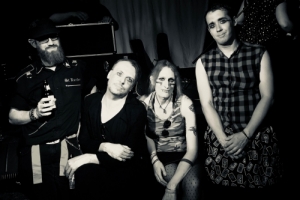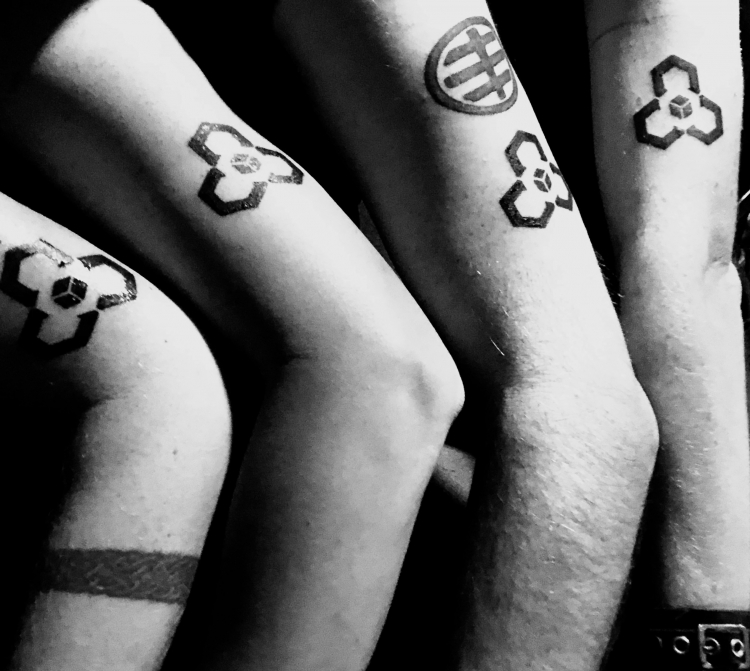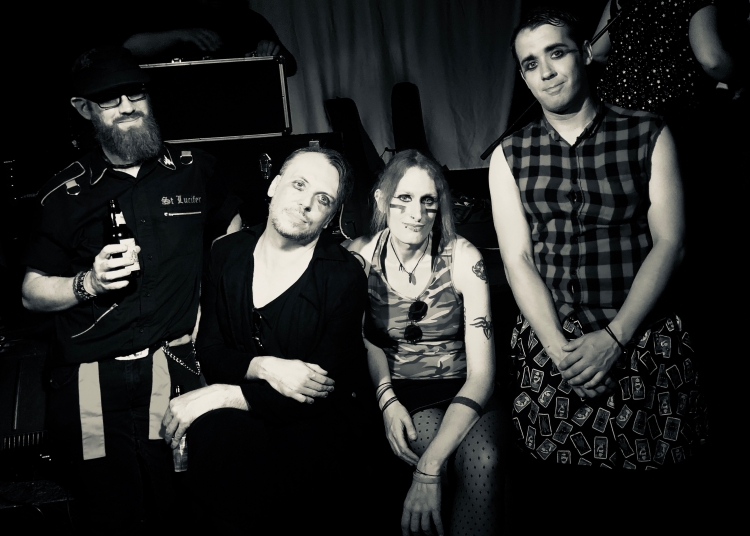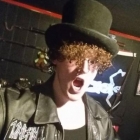
St Lucifer has plenty to say down below so I'll try and make this little prologue quick. The band's most recent outing is "Music is Violence" via AnalogueTrash records and that's what we speak of today amongst many other subjects. So, sit back, relax, hit the play button, and find out more about this lovely group of individuals:
Hello St. Lucifer and welcome to Brutal Resonance. This should be fun considering this is the first time we’ll be interviewing you. I would like to take the time to explore a bit of the project’s history and talk about your latest album. But first, let’s start with the basics. Who is in the band and what do they do, what’s your favorite album of all time, and what’s your favorite dessert?
St. Lucifer: Quick roll call: St Lucifer are David (Vocals/Guitar/Synths), Charlotte (Lead Guitar/Vocals), John (Bass/Tech) and Alice (Drums/Vocals). Our favourite albums of all time are wildly different (and change constantly depending on our various moods) but the current ‘position’ is: David, a coin flip between ‘Music Has The Right to Children’ by Boards of Canada and ‘Spirit of Eden’ by Talk Talk; Charlotte says ‘The Holy Bible’ by The Manic Street Preachers or possibly ‘Somewhere In Time’ by Iron Maiden,; John says Menthol's ‘Danger: Rock Science!’ while Alice picks ‘Energy’ by Operation Ivy.
Dessert wise it’s Lemon Cheesecake (David), Chocolate Fudge Cake (Alice), Black Forest Gateaux (John), and Banoffee Pie with Ice Cream on top (Lottie). We think it’s fair to say we’re quite an eclectic bunch!
You’ve got a full line-up between the four of you. Was St. Lucifer always a four-person project? Or did it start with fewer members at first and steadily build? While we’re at it, how did each of you wind up meeting one another?
2017 saw some big changes for the band (both professionally and personally) including the writing/demo stage of our second LP, a full UK tour and signing to Analogue Trash records (juggling parenthood, a band, day-jobs and ‘running the label the band was signed to’ was becoming one plate too many for John and David to spin). The aformentioned tour then ended with the amicable departure of Mr. Bergmann The poor chap had his finals coming up and really needed to knuckle down to ensure he passed his exams.
On the plus side we’d managed to ‘acquire’ former Action-Directe/Syd.31 guitarist Charlotte Winchcombe who rapidly expanded the sound with her trademark pyrotechnic guitar sound. The album itself "Music Is Violence" was then recorded during an increasingly ‘challenging’ period for the band - which was further complicated by Alex’s relocation to the Isle a Wight around two-thirds of the way through the recording process. After much soul-searching and ambitious plans to maintain the line-up, we ultimately realised that the sheer distance was going to impede the band progressing so we agreed another ‘conscious uncoupling’ (this time with Alex) and emerged from the studio a rather different band to the one that went in.
As the mastering/sleeve design/record label ‘stuff’ was worked through in the early part of 2018 we were extremely fortunate to then stumble over the ‘missing piece’ of the St Lucifer MK 2 jigsaw in the shape of drummer/backing vocalist Alice Class. Two gigs in and it was obvious we’d made the right choice with both the new line-up and deciding to continue as a band. Which was something of a relief!

You’ve got a lot of musical influences going on with the project. Not only from what I’ve heard on your latest album, but also from what’s listed on Facebook: industrial, post-punk, electronic, anti-pop, and noise. How do you manage to find a sound balance between all these aspects?
You’ve signed with AnalogueTrash Records in 2016 – smart and lovely folks over there – and have released your newest album “Music is Violence” on the label. Tell me, what is this album about? Is there an overall theme or individual messages per song?
Some of the tracks link together such as ‘All Lines Lead Forward’ and ‘Raise The Dead’ being bookends to one such relationship while the titular ‘Vermin’ is actually directed back at the author, not some nefarious third party. The three guest vocalists (poets Neo_101 and Emily Oldfield and Still Forever’s Amy Griffiths) all contribute pitch-perfect subject matter which slot perfectly into the albums wider themes of self-harm, trauma and (ultimately) redemption
The cover art is quite striking; it certainly sticks out in the sea of album covers I have on my PC. Who designed the cover art and what does it represent?

There are fourteen songs on the album and I highly doubt that it was a cake walk to make all of those. Take us through the production of one of your songs. Does is start with a musical note or does it build up in your head first? And how hard is it to transition that idea or note into one full song?
Do you find yourselves writing lyrics for the songs before or after the music is made? And would you consider writing the lyrics tougher than making the music?
Out of all the songs on “Music Violence”, which is your favorite and why?
What are you guys currently working on? Any new songs, EPs, remixes, etc? Do you have any tours or live shows coming up?
Lastly, I would like to thank you for your time. I leave the space below open for you to cover anything I may not have mentioned above or any final words. Cheers!
When you stand for a choice when an act could be the last, you think again.
Severe Illusion, Jan 01 2003

Steven Gullotta
info@brutalresonance.comI've been writing for Brutal Resonance since November of 2012 and now serve as the editor-in-chief. I love the dark electronic underground and usually have too much to listen to at once but I love it. I am also an editor at Aggressive Deprivation, a digital/physical magazine since March of 2016. I support the scene as much as I can from my humble laptop.
Share this interview
Facebook
Twitter
Google+
Shares
Popular interviews
Psyclon Nine
Interview, Mar 24 2017
Night Runner
Interview, Oct 13 2016
Testube
Interview, Apr 02 2022
Kite
Interview, Feb 10 2017
God Destruction
Interview, May 17 2016
Related articles
Endgame Protocol - 'American Dreams'
Review, May 08 2015
Necrotek - 'Blacklight Magick'
Review, May 10 2012
Various Artists - 'Scream From Darkness'
Review, May 23 2014
Waves Under Water - 'Red Star'
Review, May 14 2010
Rotersand - 'Truth is Fanatic'
Review, Jan 01 2003



